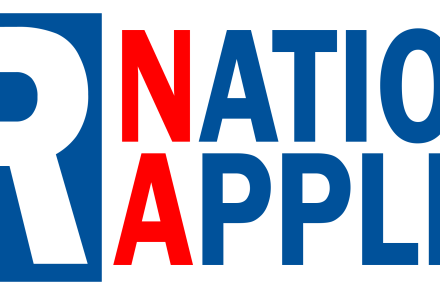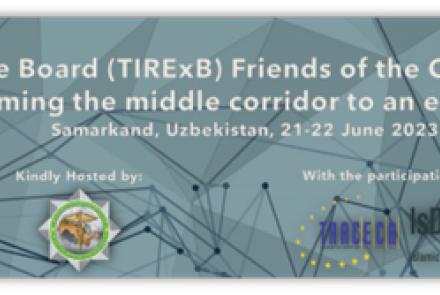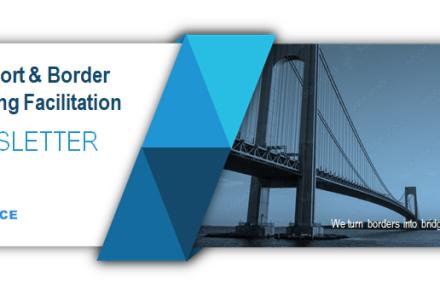Training Workshop on the Convention on the International Transport of Goods under Cover of TIR Carnets, (TIR Convention (1975) / eTIR) and Convention on the Contract for the International Carriage of Goods by Road (CMR/eCMR) in IGAD’s member States
|
Training Workshop on the Convention on the International Transport of Goods under Cover of TIR Carnets, (TIR Convention (1975) / eTIR) and Convention on the Contract for the International Carriage of Goods by Road (CMR/eCMR) in IGAD’s member States 1-2 March 2023, Djibouti, Djibouti |
||
|
Wednesday, 1 March 2023 |
||
|
09:00 – 10:00 Opening Ceremony |
||
|
Master of Ceremony: IGAD |
||
|
||
|
Session I: Transport Corridors / Transit and border crossings facilitation in IGAD region. Chairperson: Representative of the Ministry of Transport of Djibouti |
||
|
The objective of the first session is to illustrate and summarize the main challenges, requirements and operational barriers that border crossings – international transport are facing along the transport corridors in IGAD region setting the scene for the implementation of the TIR/CMR Conventions and the benefits that could bring to the Governments, Customs and the private sector. A very simple questionnaire will be distributed to all participants well before the session. The participants are required to prepare themselves and provide some information during the session regarding those questions which would be relevant to the facilitation of border crossings and international road transport in their respective countries. The floor will be provided to the countries in alphabetical order. |
||
|
10:00 – 10:20 |
Representative from IGAD |
|
|
10:20 – 10:40 |
Representative from Djibouti |
|
|
10:40 – 11:00 |
Representative from Eritrea |
|
|
11:00 – 11:20 |
Representative from Ethiopia |
|
|
11:20 – 11:45 |
Coffee Break |
|
|
11:45 – 12:05 |
Representative from Kenya |
|
|
12:05 – 12:25 |
Representative from Somalia |
|
|
12:25 – 12:45 |
Representative from South Sudan |
|
|
12:45 – 13:05 |
Representative from Sudan |
|
|
13:05 – 13:25 |
Representative from Uganda |
|
|
13:25 – 14:00 |
Discussions |
|
|
14:00 – 15:30 Lunch Break |
||
|
15:30 – 16:30 Session II: The TIR Convention and its application in IGAD region |
||
|
The objective of the second session is to present the TIR convention, illustrate its advantages for the customs authorities and the private sector, analyse its main pillars of operations and requirements for the Governments/customs authorities, the private sector / national associations and the international organization, provide information on how to accede the convention and how to operationalize it in a country as well as the requirements/training is required. |
||
|
15:30 – 16:15 Presentation of the TIR Convention: What are the main pillars and the main benefits from its application; How to accede to the convention; Application of the Convention in IGAD region; The TIR Handbook by Mr. Konstantinos Alexopoulos, Chief Transport Facilitation and Economics section, TIR Secretary (UNECE) 16:50 – 17:00 Discussions |
||
|
End of the first day |
||
|
Thursday, 2 March 2023 |
||
|
09:30 – 10:30 Session III: The eTIR international System. The electronic TIR |
||
|
The objective of the third session is to present the electronic TIR, the eTIR international system which is hosted by UNECE, the interconnection projects between the national customs systems and the eTIR international system, the benefits that customs authorities and the private sector do have from its implementation, the future steps |
||
|
09:30 – 10:10 History, High level architecture of eTIR system, Interconnection Projects and next steps by Mr. Konstantinos Alexopoulos, Chief Transport Facilitation and Economics section, TIR Secretary (UNECE) 10:10 – 10:30 Debate |
||
|
10:30 – 10:45 Coffee Break |
||
|
10:45 – 12:00 Session IV: the CMR Convention |
||
|
The objective of the fourth session is to present the contract of carriage, the CMR Convention and its eCMR protocol, the benefits that the countries’ authorities (customs, police, insurance, banks, courts) and the private sector have from its implementation, the facilitation that provides to international transport |
||
|
10:45 – 11:20 Presentation of the CMR Convention, What are the main objectives and the main benefits from its application, How to accede to the convention, Application of the Convention along the African Corridors and The eCMR protocol by Mr. Konstantinos Alexopoulos, Chief Transport Facilitation and Economics section, TIR Secretary (UNECE) 11 :20 – 12:00 Discussion |
||
|
12:00 – 13:30 Session V: Practical Implementation of the TIR /CMR Conventions |
||
|
The TIR System is a public-private partnership. The private sector and more specifically, the International Road Transport Union (IRU) following a mandate provided by TIR Administrative Committee (AC.2) provides the international guarantee required for the system to function. The objective of the fifth session is to present the efforts required from the private sector in order to operationalize the TIR system in a country. Also, during this session, lessons learned – case studies will be presented by the customs authorities and the private sector regarding the operationalization of the TIR system and the interconnection with the eTIR international system in their countries. |
||
|
12:00 – 12:45 |
Mr. Rami Karout TIR & Transit, International Road Transport Union (IRU) |
· The National Road Transport Association · The functions of the international guarantee · Claims and handling of claims · From the TIR Carnets to the electronic guarantees · Practical implementation of the CMR Convention · The benefits for road transport |
|
12:45 – 13:30 |
Discussions |
|
|
13:30 – 14:30 Lunch Break |
||
|
14:30 – 16:00 Case Studies – Lessons learned |
||
|
14:30 – 14:50 |
Representative of Tunisia |
|
|
14:50 – 15:10 |
Interventions from other countries |
|
|
15:10 – 16:00 |
Discussions |
|
|
16:00 – 16:15 Coffee Break |
||
|
Closing Session |
||
|
16:15 – 17:00 Next Steps |
||




